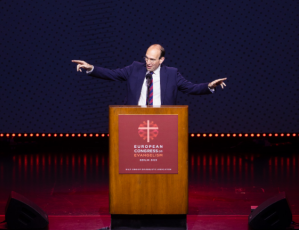
Christian Daily International was on the ground in Berlin from May 27 to 30, 2025, where more than 1,000 evangelical pastors and ministry leaders from 56 nations gathered at the JW Marriott for the European Congress on Evangelism, hosted by the Billy Graham Evangelistic Association. With the theme rooted in Romans 1:16—“For I am not ashamed of the gospel…”—the invitation-only event featured 20 speakers from 13 countries, making it the most diverse evangelical gathering in Europe since Amsterdam 2000.
Christian Daily International/Christian Post has been publishing articles during the congress and continues releasing in-depth reports, highlighting key sessions, interviews with Christian leaders, and insights shaping evangelistic strategy across the continent.
***
Rev. Michael Reeves, director of the European Theologians Network, also serves as President and Professor of Theology at Union School of Theology in Bridgend, Wales, where he specializes in systematic and historical theology, preaching, and spiritual formation. At the Berlin Congress, he delivered a main session titled “The Scope of Evangelistic Proclamation.” In an exclusive interview with Christian Daily International/Christian Post ahead of the event, Reeves discussed what he means by “scope,” the centrality of Scripture as the authority for evangelistic preaching, and the need for Holy Spirit-empowered outreach to people on the margins of church life.
Reeves defines the “scope” of evangelistic proclamation as a source of joy rather than a burden, because Jesus is not only Lord of creation but also Lord of the Great Commission. The responsibility for mission, he explains, rests with Christ himself. While some evangelicals may feel a pressing concern for measurable results, the original intent was never for believers to live under constant anxiety about outcomes.
“I think most Christians today find that the Great Commission is something of an intimidating burden to them because there's such a great and awesome task to be done,” says Reeves. “But they don't understand the context for it, which is that Christ has been raised to be the head over all things, with all things put under his feet.
“And, therefore, what the scope of evangelistic proclamation is, as Jesus says in Mark 16:15, is to go into all the world and proclaim the gospel. So it's because he's head over all things, because all things are under his feet, [that] Christians are called to proclaim the gospel to all the world.”
The surety of the theology underlying this proclamation stems from what Jesus clearly said. Reeves pinpoints Mark 7 and Matthew 15 as being helpful in bolstering the reason to have such confidence. When Jesus debated with the Pharisees, he made it clear whose authority really counted.
“And Jesus said that you nullify the Word of God for the traditions of men,” Reeves continues. “What he showed us there was that the Word of God should always have authority over the words and traditions and thoughts of men.
“So the authority for our thinking, the way to know that we're correct in our thinking, is to be faithful to scripture, not simply following what certain scholars or theologians have said.”
Even so, Reeves concedes that scholars and theologians are “useful gifts to the Church” nonetheless and therefore “they are to be respected and listened to under the authority of Scripture. And we listen to them and appreciate them insofar as they are being faithful to what Scripture says.”
Scholars and theologians are accountable to God and also to the wider Christian community because their teaching has a direct impact on the pastoral health of any given church, according to Reeves.
“And so if you get your theology wrong, your understanding of who God is wrong, your understanding of the Gospel wrong; then necessarily, that's going to have a huge pastoral impact on everyday Christians,” adds Reeves.
“If you suggest, for example, that God is the sort of God who demands that you earn His favor, that's going to affect Christians into a joyless duty whereby they don't know that they can rejoice in the Lord, but they're constantly trying to buy God off.”
That particular scenario of legalistic beliefs does not reflect a sincere love for God, Reeves says and, “therefore living out of security before Him and an adoration of One who's good.”
The governing of this accountability for theology in evangelistic proclamation, Reeves says, is by understanding that “theologians are called to be the plumbers and sewage engineers of the Church,” quoting the late Anglican theologian and author Jim Packer.
“In other words, they're supposed to get rid of the bad waste that will poison the water source and make sure that people can drink pure fresh water,” explains Reeves. “And so that's the task of teachers and theologians in the Church.
“God often teaches His people with a crooked stick. In other words, he actually uses false understandings to clarify the thinking of his people.
“It's when the Church goes wrong on something and they start seeing the consequences, God raises up a teacher who can spot that and proclaim the truth with a greater clarity than what has been seen before.”
Reeves gives an example of the medieval Church losing clarity on the fact that God is a God who declares sinners to be righteous by faith alone.
“That truth had been lost, and therefore, Christians were living with a doubt and an insecurity and a terror of what might happen to them after death.”
Reeves continues that the Lord in response to this confusion, raised up Marin Luther to “proclaim the gospel with a clarity that really hadn't been heard for a long time.”
But how does Reeves propose preaching the gospel to non-Christians who fall outside the typical scope of evangelistic efforts—those unable to hear a sermon from a pulpit in a church building, such as the homebound elderly or individuals with certain mental health conditions?
Reeves considers this an “enormous question” since it involves a diverse range of different people living within different scenarios. He reminds that the church’s evangelism should not be presented primarily via a “preacher in a pulpit.”
“A preacher in the pulpit is feeding the people who already know the Lord as well as pointing everyone who's there to Jesus Christ,” he elaborates.
“They might put their faith in him. But then they're sent out so that every Christian is then called themselves witness to those around them.
“Far more than a man in a pulpit, normal Christian evangelism looks like a believer talking with a friend, or a Christian mother speaking with her daughter,” Reeves said.
In such settings, relational trust creates what he calls a “golden opportunity” to talk about Jesus. He illustrates this with a scenario where a daughter opens up about a personal struggle, and her Christian mother gently invites her to explore it further. “The hackles, the defenses aren’t up,” Reeves noted, because the daughter feels safe in the relationship. “That’s normal evangelism for most people,” he added.
“It's sharing Jesus within the context of relationships,” he says. “And that's why the lifestyle of Christians is important as well. Now, they must actually tell people of Jesus but they win the right to be able to talk about Jesus, and they adorn the beauty of Jesus by the way in which they live Christ-like lives.”
Returning to the examples of those for whom hearing the gospel is especially difficult—so-called “hard cases” such as the homebound elderly or individuals with mental health conditions that affect their ability to listen—Reeves emphasizes that the power of God, not human ability, is what ultimately brings about salvation.
“It is found in the gospel,” he states. “That is the power of God for salvation, says Paul in Romans 1:16. And therefore, that means I can present Jesus, and I can present him in different ways depending on my context.
“So if I'm talking to very young children, then I'll present a simple gospel. If I'm speaking to academic theologians, it's the same gospel, but at different levels.”
Reeves argues that it is the power of God alone that brings salvation—powerful enough to reach both the tender hearts of children and the discerning minds of academic theologians alike. This transformation, he says, occurs only when individuals are moved by the Spirit to open their hearts and respond to the gospel in love and trust toward Jesus.
“And that is a power that can work even through mental abilities, mental inabilities,” Reeves says. “The gospel is powerful in all situations because the work of the gospel is not just to enable us to change a little bit. It's giving new life to the spiritually dead. So a slight mental inability is nothing. No problem for the Lord.”
Friendship evangelism, with the “man in the pulpit” empowering the congregation to venture out and share Jesus, building relationships, “that’s where ‘it’ is,” says Reeves.
Reeves also allows for the benefits of non-direct evangelism such as an evangelical inviting a friend to a church meeting if they struggle with confidence to talk about Jesus directly. “Well, I'm not very good at explaining all this myself,” he imagines the intimate dialogue of such a Christian with an acquaintance. “Come along and meet a man who can.”
This is actually an exemplar set forth in the gospels themselves: “We see that in the gospels too. And for those who are unable to be brought into the church to hear that—like the old lady stuck in her home—then we have to think about it in a different way with the budding relationship, but then proclaim the Word as well at some point,” says Reeves.
Technology is a prominent driver in enabling people struggling to leave their homes, such as some elderly, to access not only “good Christian teaching” but also a “certain amount of Christian fellowship.” Reeves says “we’re in a very exciting age today” because of the opportunities that present for proclaiming the gospel.
“And so I know the importance of being able to reach people who are homebound or bedbound. But we have the ability with our technology today to do that in a way we've never been able to do,” Reeves says.
“And that same technology that can reach bedbound people is the same technology that can get into closed countries. It can get to hard-to-reach areas. And that's one of the things that my ministry [Union School of Theology in Bridgend, Wales], is eager to do.
“We're seeking to get good resources globally available so that wherever people are, they can access pure gospel teaching.”






